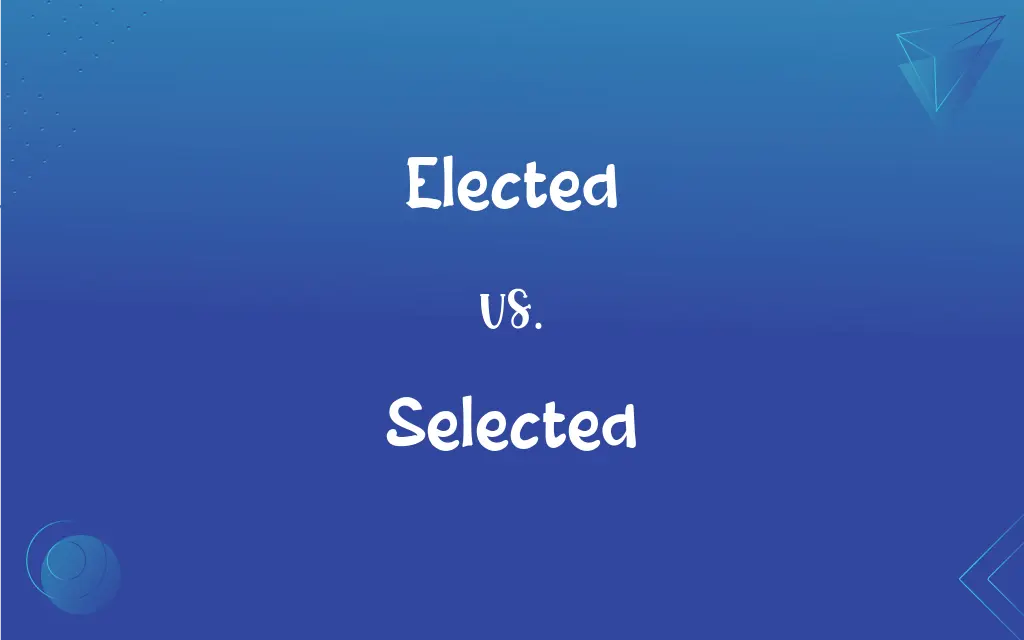Elected vs. Selected: What's the Difference?
Edited by Aimie Carlson || By Janet White || Published on December 13, 2023
Elected refers to being chosen by voting, while selected means being chosen or picked out from a group, often by decision or preference.

Key Differences
Elected implies a democratic process where individuals cast votes to choose a person for a specific role, like a political office. Selected, however, involves a choice or decision made by an individual or a group, often based on criteria or qualifications.
Elected is predominantly used in political or organizational contexts where the choice is made by the members or the public. Selected is more versatile, used in various scenarios from academic selections to everyday decisions.
When someone is elected, it often conveys a sense of authority and legitimacy, as it reflects the will of the majority. Being selected, on the other hand, can imply a special recognition of abilities or suitability for a particular purpose or role.
Elected processes usually involve a broader base of participants making a collective decision. In contrast, selected often involves fewer decision-makers, and the process can be more subjective.
Election is a more formal, often regulated process with established rules. Selection can be less formal, more flexible, and can vary greatly depending on the context and criteria used.
ADVERTISEMENT
Comparison Chart
Decision Process
Democratic voting
Decision by an individual or a committee
Typical Context
Political offices, organizational leadership
Job appointments, academic admissions
Authority & Legitimacy
Reflects majority's will, confers authority
Based on specific criteria or preference
Participation Level
Involves many participants
Often fewer decision-makers, more subjective
Formality and Regulation
Formal and often legally regulated
Less formal, varies by situation
ADVERTISEMENT
Elected and Selected Definitions
Elected
Selected via a formal voting process in an organization or society.
The new chairman was elected during the annual general meeting.
Selected
Identified and chosen for a particular purpose or task.
The jury was selected from a pool of potential candidates.
Elected
Chosen by vote for a specific position or office.
She was elected as the mayor in a landslide victory.
Selected
Picked out as the preferred or most suitable.
The artist was selected for the exhibition for his unique style.
Elected
Designated by the preference of a majority in a group.
He was elected as the captain of the soccer team by his teammates.
Selected
Appointed or chosen based on decision by an individual or authority.
He was selected as the project leader by the management team.
Elected
Appointed through a democratic process within a community.
The community elected him to lead the neighborhood watch.
Selected
Identified for inclusion in a group, team, or organization.
The athletes were selected for the national team after rigorous trials.
Elected
Chosen by a group to represent them in a specific capacity.
She was elected as the spokesperson for the environmental campaign.
Selected
Chosen from a group based on specific criteria or qualifications.
She was selected for the scholarship due to her outstanding academic record.
Elected
To select by vote for an office or for membership
Elected her club president.
Selected
To take as a choice from among several; pick out
We selected the ripest pears at the orchard. The winning ticket was selected at random.
Elected
To pick out; select
Elect an art course.
Selected
To make a choice or selection
The menu offered numerous dishes to select from.
FAQs
Does elected imply a formal role?
Generally, yes, being elected usually implies a formal role or position.
What does it mean to be elected?
Being elected means being chosen for a position or role through a voting process.
Is being elected always a democratic process?
Yes, election typically involves a democratic process with voting by a group.
What contexts use the term selected?
Selected is used in various contexts, like job appointments, academic admissions, or team formations.
Can someone be selected without an application process?
Yes, selection can be based on recognition or decision without a formal application.
Can the term selected imply exclusivity?
Yes, being selected often implies being chosen for something exclusive or prestigious.
What's the difference in authority between elected and selected?
Elected positions often carry more authority, as they represent a collective decision, whereas selected roles are more based on individual or committee decisions.
Are selections always subjective?
Selections can be subjective but often follow set criteria or qualifications.
Do all elections require campaigning?
Not all, but many, especially in political contexts, involve some form of campaigning.
Can an elected position be unpaid?
Yes, some elected positions, especially in volunteer organizations, can be unpaid.
Can elected roles be overturned?
Yes, in some contexts, elected roles can be overturned by votes or legal processes.
Are elections always for individuals?
Primarily, but sometimes groups or parties can be elected in a collective manner.
Is an election process always public?
Most elections, especially in political contexts, are public, but some organizational elections might be private.
Are elections used in corporate settings?
Yes, elections can be used in corporate settings for boards or committees.
Can one be selected by a machine or algorithm?
Yes, selections can be made by algorithms, especially in data-driven contexts.
What is the main factor in being selected?
The main factor varies but usually includes qualifications, skills, or suitability.
Can a selection be random?
Yes, selections can be random, such as in lotteries or random draws.
Is being selected always an honor?
Often, but it depends on the context and the nature of the selection.
Is an elected role always for a fixed term?
Often, but not always. Some elected roles may have indefinite terms or until a successor is elected.
Does selection always involve competition?
Often, but not always. Some selections are made from a non-competitive pool.
About Author
Written by
Janet WhiteJanet White has been an esteemed writer and blogger for Difference Wiki. Holding a Master's degree in Science and Medical Journalism from the prestigious Boston University, she has consistently demonstrated her expertise and passion for her field. When she's not immersed in her work, Janet relishes her time exercising, delving into a good book, and cherishing moments with friends and family.
Edited by
Aimie CarlsonAimie Carlson, holding a master's degree in English literature, is a fervent English language enthusiast. She lends her writing talents to Difference Wiki, a prominent website that specializes in comparisons, offering readers insightful analyses that both captivate and inform.






































































